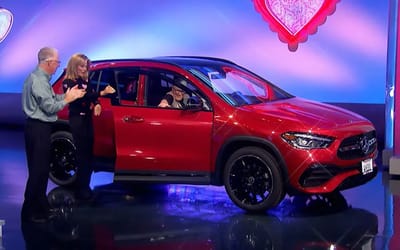Next-gen EV leaves modern ICE sports car reeling in astonishing test that compares the two
Published on Aug 19, 2025 at 11:08 PM (UTC+4)
by Callum Tokody
Last updated on Aug 19, 2025 at 1:39 PM (UTC+4)
Edited by
Emma Matthews
The Lucid Gravity electric vehicle has outpaced the Corvette sports car in controlled testing, showing how the performance gap between EVs and traditional models is closing quickly.
Independent test data confirmed that the Lucid Gravity posted faster acceleration than the Corvette Z06, one of the most established names in American performance.
The electric vehicle achieved high speeds with power levels typically linked to smaller sports cars.
These figures point to a shift in the way electric vehicles are measured against long-standing performance standards.
VISIT SBX CARS – View live supercar auctions powered by Supercar Blondie
Faster than a sports car
The Corvette Z06 has long been regarded as a benchmark sports car, powered by a naturally aspirated V8 engine and built around a lightweight chassis.
In comparison, the Lucid Gravity SUV produced times that went beyond expectations for a vehicle of its category.

The Grand Touring version of the electric vehicle generates up to 845hp and completed a 0-60mph run in 3.4 seconds.
Car and Driver noted that ‘it was a beast in every acceleration metric,’ drawing attention to how an electric vehicle matched and in some cases exceeded the performance of a dedicated sports car.
The Lucid Gravity reached 30mph in 1.4 seconds, 70mph in 3.7 seconds, and 100mph in 5.9 seconds.

Analysts estimated that operating the electric vehicle could save drivers around $1,500 per year compared to the upkeep of a combustion-powered sports car.
Testing director Dave Vanderwerp observed that the SUV delivered ‘a sort of second wave of thrust starting around 60mph,’ highlighting how the performance of the Lucid Gravity differs from that of the Corvette.
Why this matters for EVs
The Lucid Gravity’s showing against a Chevy Corvette sports car highlights a wider development in the industry.
Global sales of electric vehicles climbed to 17.1 million units in 2024. That’s a 25 percent increase from the previous year, according to the International Energy Agency.
These figures reflect how electric vehicle demand is rising in both mainstream and performance markets.
Vehicles like the Lucid Gravity demonstrate that electric technology is competing directly with established sports cars, not only on efficiency but also on speed and power.

The Corvette remains an important symbol of American engineering. But results like these indicate that electric vehicles are reshaping performance benchmarks.
As charging infrastructure grows and renewable energy becomes more common, the case for switching to an electric vehicle now includes both reduced running costs and competitive performance.
The Lucid Gravity’s test results against a Corvette sports car suggest that the next stage of automotive competition will be defined by how electric vehicles set the pace for the future of performance driving.
DISCOVER SBX CARS: The global premium car auction platform powered by Supercar Blondie
Callum has vast and varied experience, presenting a radio show and founding his own magazine to name just a couple of his accolades. In addition to his role as PR & Partnerships Coordinator, liaising with the most prestigious car brands in the world, Callum also heads up the website’s daily news. When he's not at his desk he can be found testing out the ASMR and driving UX of the latest supercar and EV launches.




